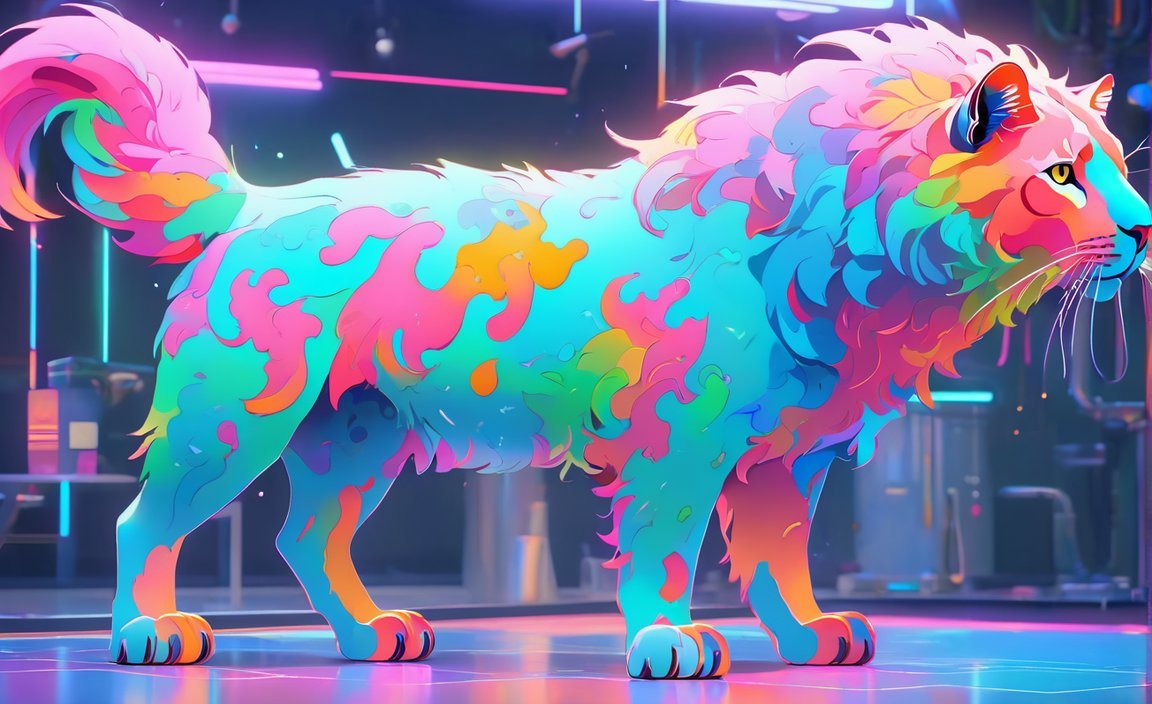Calling all animal enthusiasts! Let’s dive into the fascinating world of veterinarians. From meeting furry friends to saving furry lives, discover 10 paw-somely fun facts about their amazing journey. Join us as we uncover the joys, challenges, and heartwarming moments that make the life of a vet an extraordinary adventure.

10 Fun Facts about Being a Vet
Ever wondered what it’s really like to be a vet? It’s more than just cuddles and puppy breath (although there’s definitely a lot of that!). Here are 10 things you might not know about this amazing profession:
- “Vet” is short for “working animals.” The word veterinarian actually comes from the Latin “veterinae,” meaning “working animals.” It makes sense, right? Vets have been taking care of working animals for centuries!
- It’s a woman’s world! Did you know that about 80% of vets are women? That’s a huge change from years past and shows how many amazing women are choosing this career path.
- Think of them like specialists. Just like human doctors, vets often focus on specific areas. Some vets work exclusively with small animals like cats and dogs, while others might specialize in surgery, dentistry, or even caring for exotic animals like snakes and birds!
- It’s an emotional rollercoaster. Being a vet isn’t just about taking care of furry patients, it’s also about supporting their human families. Vets are there for the good times and the sad times, offering comfort and guidance when pets get sick or pass away. It takes a special kind of person to handle those tough moments with compassion and grace.
- Watch out for those paws! Vets don’t just deal with cuddly creatures; they also face the occasional (or frequent!) scratch, bite, or kick from a scared or grumpy patient. It’s all part of the job!
- Disease detectives. Vets are like the frontline defense against diseases that can spread from animals to humans. They’re trained to spot the signs of these zoonotic diseases and play a crucial role in keeping both animals and people healthy.
- Lifelong learners. Veterinary medicine is always evolving, with new treatments and technologies constantly emerging. That means vets are committed to lifelong learning, always studying and staying up-to-date to provide the best possible care.
- The best reward? A happy, healthy pet! Despite the challenges, nothing beats the feeling of seeing a pet recover from an illness or injury. Those heartwarming moments of healing make all the hard work worthwhile.
- Empathy is a superpower! Vets have an amazing ability to understand and share the feelings of both animals and their humans. They offer a listening ear, a shoulder to cry on, and a whole lot of empathy during difficult times.
- Advocates for animals everywhere. A vet’s commitment to animals goes beyond the clinic walls. Many vets are passionate about animal welfare and work tirelessly to educate others about responsible pet ownership and advocate for animals in need.
If you’re curious about what it’s like to be a veterinarian, check out these 10 fun facts about being a veterinarian. From heartwarming stories to fascinating medical breakthroughs, you won’t want to miss it! Read more
Did you know that veterinarians are superheroes for our furry friends? Discover 10 fun facts about veterinarians that will leave you amazed and appreciative of the incredible work they do. Click here to learn more!
Have you ever wondered what it’s like to be a vet? These 10 fun facts about vets will give you the inside scoop on their exciting and challenging profession. Don’t miss out, click here to find out more!
Did you know that therapy dogs have incredible abilities to heal and comfort? Dive into these 10 fun facts about therapy dogs and explore the amazing ways they assist humans in need. Click here for some heartwarming insights!
From wagging tails to playful purrs, pets bring so much joy to our lives. Discover 10 fun facts about pets that will make you appreciate their unique characteristics and the benefits of pet ownership. Click here to uncover the secrets of our beloved animal companions!
Are you a dog lover or a cat lover? Get ready to be amazed by these 10 fun facts about dogs and cats. From quirky behaviors to fascinating abilities, this article will leave you with a newfound appreciation for our furry friends. Explore more here!
Did you know that animals have some extraordinary teeth? Explore these 10 fun facts about animal teeth and discover the fascinating world of dental adaptations in the animal kingdom. Get ready to be amazed, click here to learn more!

What are 5 Interesting Facts about Veterinarians?
Okay, so we’ve talked about how cool the vet world is, but let’s dive a little deeper into some things you might not know!
- Becoming a vet takes some serious brainpower (and time!). Think about it: animals can’t exactly tell you what’s wrong, right? Vets have to be like detectives, spending years in school learning everything about animal bodies, how they work, and what happens when things go haywire.
- Cats and dogs are just the tip of the iceberg! You’ve got vets who are basically horse whisperers, others who are like the Dr. Doolittles of the reptile world, and some who specialize in creatures most of us only see in zoos. This means that if you’re passionate about a certain type of animal, there’s probably a vet out there who shares your love!
- They’re like secret agents for human health, too! Okay, maybe not so secret, but still super important. Vets are on the lookout for diseases that can jump from animals to us humans (they’re called zoonotic diseases). By tracking these diseases and figuring out how to stop them, vets help keep all of us healthy—furry, scaly, and everything in between!
- Being a vet takes a lot of heart, too. Let’s be real, dealing with sick animals and worried pet parents can be tough. Vets have to be both scientifically minded and super compassionate. They’re there to celebrate the good times with happy, healthy pets, but they’re also there to offer comfort and support when things get ruff.
- They’ve got some pretty awesome gadgets! Gone are the days of just a stethoscope and a thermometer! Nowadays, vets use all sorts of high-tech tools, like digital X-rays, ultrasound machines, and even lasers! This helps them figure out exactly what’s going on with their patients and give them the best possible care.
Why Is It Fun to Be a Vet?
So, we’ve talked about how rewarding a vet’s job can be, but let’s dive into the fun stuff! What makes this career path exciting and enjoyable?
Making a Difference, One Furry Friend at a Time
Imagine starting your day knowing you’ll be making a real difference in the lives of animals! As a vet, you’re not just treating illnesses; you’re bringing comfort to furry friends and their humans. Every time you ease an animal’s pain, help them heal, or give them a clean bill of health, you’re adding a little more joy to the world.
Puzzles with Paws: The Thrill of the Unknown
Veterinary medicine is like a puzzle with endlessly fascinating variations. Every day brings new patients, each with their own unique story and set of symptoms. You become a detective, using your knowledge and intuition to figure out what’s wrong and how to best help. Some days it might be a routine check-up, other days it could be a challenging case that really puts your skills to the test. This constant learning and problem-solving keep things interesting!
A World of Opportunities Awaits
One of the coolest things about being a vet is the wide range of career paths you can explore. Love the idea of working with families and their furry companions? Private practice might be your calling. If you’re passionate about a specific area like surgery or animal dentistry, you can specialize and become a true expert. Teaching, research, working with exotic animals, or even contributing to public health initiatives – veterinary medicine opens doors to diverse and fulfilling careers.
Building Bonds That Last a Lifetime
Being a vet is about more than just medicine; it’s about building relationships. You become a trusted advisor to pet parents, guiding them through important decisions about their furry family members. The bond you form with both the animals and their humans is incredibly special. Seeing the relief and gratitude in their eyes when you’ve helped their beloved pet? Priceless.
Never Stop Learning, Never Stop Growing
The world of veterinary medicine is always evolving, with new discoveries, techniques, and treatments emerging all the time. This means your learning journey never ends! As a vet, you’ll have countless opportunities to expand your knowledge, attend conferences, and stay at the forefront of your field. It’s a career that keeps your mind sharp and fuels a lifelong passion for knowledge.
Important Note:
While this article highlights the fun and rewarding aspects of being a vet, it’s also important to remember that the profession comes with its own unique challenges and demands. It requires dedication, compassion, resilience, and a genuine love for animals.
What Do Vets Do: Facts for Kids?
So, we know vets take care of our pets, but did you know they do a whole lot more than just that? It’s like being a super-doctor for all kinds of furry, feathered, and even scaly friends!
More Than Just Your Furry Friends
It’s easy to think vets only work with cats and dogs, but they actually care for all sorts of animals! Think about horses galloping on a farm, cows grazing in a field, or even those amazing lions and tigers you see at the zoo. Yep, vets take care of them all! Some vets, called large animal veterinarians, focus on farm animals, while others, called small animal veterinarians, work with our beloved pets.
Veterinarians: The Animal Detectives!
Imagine a vet as a detective, carefully searching for clues to figure out what’s making an animal sick. They use their super-smarts about how animals’ bodies work and how they behave to figure out what’s going on. They’ll examine the animal, talk to the owner about any unusual behaviors or symptoms, and maybe even do some tests. It’s like solving a puzzle to help their animal patients feel better!
Science and Technology to the Rescue!
Vets aren’t just amazing doctors; they also use cool technology to help animals! X-rays, blood tests, and even ultrasounds are all tools vets use to diagnose and treat their patients. And guess what? They even work with scientists to create new medicines and vaccines to keep animals healthy and prevent them from getting sick in the first place.
Teachers of Tiny Humans (and Big Ones Too!)
Have you ever wondered how to keep your pet super healthy and happy? Well, vets love to share their knowledge! They often talk to pet owners about the best ways to care for their furry, feathered, or scaly companions. And they don’t stop there—they also teach other vets and even students who want to be vets someday!
Veterinarians Can Specialize Too!
Just like doctors for people, vets can become experts in specific areas of animal health. Some might focus on performing surgeries, while others might specialize in things like skin problems, eye diseases, or internal issues. It’s like having a whole team of animal health superheroes!
Animal Advocates: Speaking Up for Those Who Can’t
Vets do more than just treat sick animals; they’re also their biggest cheerleaders! They work hard to make sure animals are treated kindly and are protected from harm. They want all animals to have safe and loving homes and believe it’s important for people to understand how to care for their animal companions responsibly.
Think about it:
- Vets are like animal superheroes who take care of creatures big and small, from tiny hamsters to giant elephants!
- They use their detective skills and scientific knowledge to help sick animals feel better.
- Vets are also teachers, sharing their wisdom with pet owners and future vets.
- They are passionate about making sure animals are treated well and have happy, healthy lives.
So next time you see a vet, remember they’re not just animal doctors but also scientists, teachers, and animal heroes!
What Should I Know to Be a Vet?
So, you’re thinking about becoming a vet? That’s awesome! It’s a truly rewarding career path, but it also requires a lot of dedication and hard work. To give you a better idea, let’s dive a little deeper into what you should know before jumping in:
- It’s More Than Just Cats and Dogs: You’ll probably see plenty of furry friends, but vets can work with a wild variety of animals! Think farm animals like cows and pigs, exotic pets like birds and reptiles, and even wildlife. It depends on your interests and where you end up practicing.
- You’ll Be a Bit of a Detective: Figuring out what’s wrong with an animal isn’t always straightforward. Vets often need to piece together clues from physical exams, the animal’s history, and sometimes even lab tests.
- Communication is Key: Being able to clearly explain diagnoses, treatment options, and home care instructions to pet owners is super important. You’ll be their guide through some stressful situations, so patience and empathy are crucial.
- Prepare to be a Lifelong Learner: The world of veterinary medicine is constantly evolving with new discoveries and treatments. You’ll need to stay updated through continuing education courses, conferences, and by reading the latest research.
- Teamwork Makes the Dream Work: Vets don’t work alone! You’ll collaborate closely with veterinary technicians, assistants, and other specialists to provide the best possible care.
- The Emotional Rollercoaster is Real: Let’s be honest, dealing with sick and injured animals can be emotionally tough. You’ll experience incredible highs when helping animals recover, but also heartbreaking lows when facing difficult cases. It’s important to have strong coping mechanisms and a good support system.
- Get Ready to Advocate for Animals: Vets play a vital role in promoting animal welfare. This can involve educating the public, supporting animal shelters and rescue groups, or even working to influence animal welfare legislation.
- It’s a Challenging But Rewarding Path: Becoming a vet requires a lot of time, dedication, and financial investment. But for animal lovers passionate about making a difference, it can be an incredibly fulfilling career.
Want to Learn More?
This is just a glimpse into the world of veterinary medicine! There are so many resources available to help you explore further:
- American Veterinary Medical Association (AVMA): The AVMA website offers a wealth of information about the veterinary profession, including educational requirements, career paths, and resources for aspiring vets.
- Shadowing Opportunities: One of the best ways to learn about the day-to-day life of a vet is by shadowing one! Reach out to local veterinary clinics or hospitals to see if they offer shadowing experiences.
- Volunteer at Animal Shelters or Rescues: Volunteering is a fantastic way to gain hands-on experience with animals and learn about different aspects of animal care.
Remember, becoming a vet is a big decision, but with passion, dedication, and the right information, you can embark on this incredible journey!
Who Is the Most Famous Veterinary Doctor in the World?
Picking the most famous vet is a bit like choosing the best ice cream flavor – everyone has their favorite! Veterinary medicine is filled with incredible people who’ve dedicated their lives to helping animals.
While there isn’t one vet everyone agrees is the “most” famous, some names definitely ring a bell more than others. Take James Herriot, for example. His heartwarming stories about life as a country vet in England charmed readers around the world. His books, like “All Creatures Great and Small,” weren’t just about treating sick animals, they were about the special bond between humans and their furry, feathered, or scaly companions. Herriot’s writing may have influenced how people view vets—not just as medical professionals, but as compassionate caregivers.
Going further back in time, we have Claude Bourgelat, a French veterinarian considered by many to be the father of modern veterinary medicine. Back in the 18th century, he founded the world’s first veterinary school in Lyon, France. This paved the way for vets to receive formal education and training, elevating the entire profession.
Then there’s Dr. Louis J. Camuti, an American vet who became a household name in the mid-1900s. He was like the animal doctor to the stars! Famous folks trusted him with their beloved pets, and he even had his own radio show and newspaper column, where he’d offer pet advice. Dr. Camuti’s media presence probably made him more recognizable and may have helped popularize veterinary medicine.
These are just a few examples, and it’s important to remember that “fame” can be fleeting. The most important thing is the impact these vets and countless others have had on animal health. They’ve pushed the boundaries of veterinary medicine, developed life-saving treatments, and inspired future generations of animal lovers to pursue careers in this rewarding field.
What are the 5 Most Important Knowledge Areas for a Veterinarian?
Let’s delve into those essential areas of expertise for veterinarians.
- Understanding animal health and physiology: This is like the foundation. Just like a doctor needs to know how the human body works, a vet needs a deep understanding of an animal’s inner workings. This knowledge helps them spot signs of sickness, figure out the best treatment plans, and offer preventive care to keep our furry friends healthy.
- Veterinarians must be proficient in medical techniques: Think of this as the tools of the trade. Vets need to be skilled in a variety of medical techniques, like surgery for injuries, radiology to see inside the body, and anesthesia to keep animals comfortable during procedures. These skills are crucial for treating a wide range of animal injuries and illnesses.
- Diagnostic skills are essential: This is where a vet becomes a detective of animal health. Vets use their diagnostic skills to accurately pinpoint what’s making an animal unwell. It’s about connecting the dots–observing symptoms, running tests, and analyzing the results to determine the root cause of the problem and prescribe the right treatment.
- Communication and interpersonal skills: Being a vet isn’t just about animals; it’s about people too. Vets need strong communication skills to build trust with both animals and their human companions. Clearly explaining things to pet owners, offering reassurance, and providing instructions in a way that’s easy to understand is key.
- Veterinary professionals must stay up-to-date on advances: Just like technology is always changing, so is the world of veterinary medicine! New discoveries, treatments, and technologies are always emerging. Vets are committed to lifelong learning, always seeking out the latest advancements to ensure they’re providing the most effective and cutting-edge care.
How Important Is Veterinary Medicine?
We all know that vets are the ones we run to when our furry friends are under the weather, but their importance goes way beyond just treating a sick pup or kitty. For example, have you ever thought about how some illnesses can actually jump from animals to humans? Vets are like guardians against that, working hard to stop these zoonotic diseases from spreading and keeping us all safe.
And it’s not just about our pets either. Veterinarians care for all sorts of animals–farm animals that provide our food, wild animals living in their natural habitats, and even those cool and unusual creatures you might find in a zoo. They’re ensuring the health and happiness of all creatures great and small.
Veterinary medicine is an amazing blend of scientific knowledge and genuine compassion. You gotta have the brains to understand complex medical issues, but also a big heart to comfort those furry patients (and their worried humans!).
Plus, vets are always on the cutting edge of new discoveries and techniques. They’re constantly researching and exploring new ways to improve animal health and welfare, which ultimately benefits us all. Think about it–advancements in animal medicine can sometimes lead to breakthroughs in human medicine too!
So yeah, veterinary medicine is super important. They’re the unsung heroes who keep our furry friends healthy, protect us from diseases, and constantly push the boundaries of animal care.
What Is the Most Common Type of Vet?
We’ve talked about all kinds of vets, but the most common type focuses on our furry (and sometimes scaly or feathered) friends! You know, the ones we share our homes and lives with. Small animal veterinarians are the ones who take care of our beloved dogs and cats, as well as those adorable rabbits, hamsters, and other small pets that steal our hearts.
Think about it: almost every household has a pet, right? Dogs and cats are like family, and when they’re under the weather, we want them to see the best.
Now, this doesn’t mean other types of vets, like those who work with horses or exotic animals, are any less important. It’s just that the sheer number of people with dogs and cats means there’s a huge need for vets who specialize in their care.
Veterinary medicine is always changing and improving. New discoveries and technologies are constantly emerging. This means that the field is always evolving, and who knows, maybe one day we’ll see even more specialized types of vets emerge!
How Many Vets Are There in the World?
So, we’ve talked about what vets do and how important they are. But have you ever wondered just how many vets there are out there, taking care of all those furry (and not-so-furry) friends? Well, figuring that out isn’t as easy as you might think!
Every country does things a bit differently. They might have their own ways of keeping track of who’s a vet, and those methods might not always match up perfectly.
Some countries have really organized systems for this, while others are still working on it. And then there’s the question of what counts as a “vet” in the first place. Does it include everyone with a veterinary degree, even if they’re not actively practicing? What about vet techs and other animal care professionals–do they get counted too?
All of this to say, getting a precise number on the global vet population is tricky. It’s a moving target! Researchers are constantly gathering new information and refining their estimates, but it’s an ongoing process.
However, even without an exact number, we can say that there are a lot of dedicated vets out there, working hard to keep animals healthy all around the world. They might not always make the headlines, but they’re out there, making a difference one furry (or scaly, or feathered) friend at a time!
What Do Vets Wear?
So, we’ve talked about the cool stuff vets do, but have you ever wondered what they wear while doing it? You might picture them in those typical scrubs or lab coats, and you’re not wrong! But there’s actually a whole lot more to vet fashion than you might think.
A vet’s wardrobe is all about finding that sweet spot between looking professional and being practical. They need clothes that can handle anything from a playful puppy to a muddy horse, all while keeping them comfy during those long days.
Scrubs are a go-to for many vets, especially when they’re in the office or working with smaller animals. They’re easy to move around in and can be tossed in the wash after a particularly messy appointment! Lab coats are another classic choice, often worn over scrubs for an extra layer of protection. They might also make vets seem more official, which can be reassuring for both pets and their humans.
Now, when it comes to working with larger animals like horses or cows, vets often switch gears. Khaki pants or tough jeans paired with a button-up shirt become the outfit of choice. This combo gives them the freedom to move around easily and can withstand the wear and tear that comes with working with bigger animals. Plus, they can easily throw on a clean shirt if needed!
And let’s not forget about shoes! Imagine being on your feet all day, running from appointments to surgeries. Vets need footwear that can keep up. Running shoes or comfy flats with closed toes are popular choices because they provide support and prevent any unexpected slips on a potentially messy floor.
Of course, safety always comes first! Depending on the situation, vets might also wear protective gear like gloves, masks, and safety glasses. These are essential when dealing with animals who might have contagious illnesses, during surgery, or when working with potentially dangerous substances.
But it’s not just about practicality–a vet who feels confident and put-together can project an aura of professionalism and trustworthiness. Plus, wearing fun scrubs with bright colors or interesting patterns can actually help create a more calming and welcoming environment, especially for nervous animals.
So, the next time you’re at the vet’s office, take a moment to appreciate their outfit. It’s likely a carefully considered combination of practicality, professionalism, and maybe even a touch of personal style!
- Unveiling Bernhard Caesar Einstein’s Scientific Achievements: A Legacy in Engineering - July 15, 2025
- Uncover who is Jerry McSorley: CEO, Family Man, Business Success Story - July 15, 2025
- Discover Bernhard Caesar Einstein’s Scientific Contributions: Unveiling a Legacy Beyond Einstein - July 15, 2025















